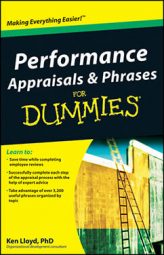Effective words to use in a workplace performance appraisal
Here are the most effective words you can use in a variety of job performance appraisal categories:
-
Quality and quantity of work: accuracy, thoroughness, productivity, and goal attainment
-
Communication and interpersonal skills: teamwork, cooperation, listening, persuasion, and empathy
-
Planning, administration, and organization: goal setting, prioritizing, and profit orientation
-
Leadership: accessibility, responsiveness, decisiveness, collaboration, and delegating
-
Job knowledge and expertise: knowledge base, training, mentoring, modeling, and researching
-
Attitude: dedication, loyalty, reliability, flexibility, initiative, energy, and volunteering
-
Ethics: diversity, sustainability, honesty, integrity, fairness, and professionalism
-
Creative thinking: innovation, receptiveness, problem solving, and originality
-
Self-development and growth: learning, education, advancement, skill building, and career planning
Preparing to appraise job performance
When conducting a performance appraisal in the workplace, make sure that you are well prepared to assess your employee’s performance and deliver your evaluation.
Use this checklist to help you provide meaningful, motivational, and lasting feedback for your employees.
-
See yourself as a leader. If you approach the appraisal process as your employees’ buddy, you’ll have difficulty being objective — and they’ll have difficulty accepting your feedback.
-
Set positive expectations. If you expect performance appraisals to go smoothly, effectively, and productively, it’s far more likely that they will.
-
Spend time with your employees. The more familiar you are with your employees and their performance, the more accurate and acceptable your feedback will be.
-
Know the system. Look over your company’s performance appraisal system and be sure you know exactly how it works.
-
Back-time the process. Set the dates of the appraisal sessions first, and then work backward to establish the benchmark actions that you need to complete before meeting with the employees.
-
Gather and review all the relevant data. Look through your notes and supplement them with your employees’ job descriptions, last year’s appraisals, the objectives that you established with your employees, each employee’s file, and your employees’ self-evaluations and 360-degree feedback forms (if you use them).
-
Complete the evaluation forms. Start with written comments and phrases, and then select numerical ratings that fit what you’ve written. Review the recommended raises, if any, and then finalize the evaluations.
-
Plan the agenda for the meeting. Be sure to provide extra time at the end to complete the discussions and answer all questions.
How to conduct a performance appraisal
As you conduct performance appraisal sessions as a manager or supervisor, use the following guidelines to help you increase the likelihood of having a positive and productive exchange with your employees.
-
Open on an upbeat note. Start the discussion with friendly greetings — this sets the tone for the rest of the session.
-
Lay out the framework. Let employees know the topics you plan to cover, as well as the order in which you plan to cover them.
-
Ask for questions. This will raise employees’ comfort level and eliminate nagging issues that could distract them.
-
Focus on performance. Keep your feedback focused on your employees’ performance, especially in terms of meeting objectives, achieving results, handling critical incidents, and developing competencies.
-
Discuss the evaluations. Walk through the evaluations with your employees and provide them with specific information regarding the rationale behind your ratings. If you use self-evaluations, discuss the points where you and your employees agree and disagree.
-
Listen actively. Rephrase and summarize what your employees say, to make sure you truly understand them.
-
Clarify the overall ratings. Discuss the overall ratings with your employees and provide specific information regarding the criteria that you used to determine them.
-
End the sessions positively. Summarize the discussion, ask for final questions, set follow-up dates for goal setting, have the employees sign hard copies of the evaluations, and end with positive expectations.
How to follow up after a job performance appraisal session
After you’ve conducted and completed a performance appraisal or evaluation session with an employee, it’s time to shift your focus from their past performance to their future performance.
These tips will help you to manage your employees more effectively and ensure that they meet future performance goals.
-
Set performance goals with each employee. These goals focus on the employee’s specific performance on the job, such as his productivity, output, results, competencies, and behaviors.
-
Set developmental goals with each employee. These goals focus on building the employee’s expertise, skills, and abilities. The idea is to make strengths even stronger, as well as to develop the areas in which the employee’s knowledge and skills are deficient.
-
Create real goals. Real goals are specific, achievable, prioritized, measurable, supported by action plans, aligned with the company, linked to your goals, and accepted by you and your employees.
-
Wander around. Your effectiveness in the performance appraisal process, as well as your effectiveness as a manager, will be greatly enhanced if you spend time working directly with your employees, observing their performance, and maintaining a high degree of contact and communication with them throughout the evaluation period.
-
Be a coach. Take the time to regularly recognize your employees when they’re performing particularly well, and to provide them with formal and informal coaching, guidance, feedback, direction, and follow-up not only to further build their strengths, but also to upgrade their performance in areas where it has fallen short.
-
Remember your role. You are your employees’ central role model, and that makes you their most compelling trainer.

